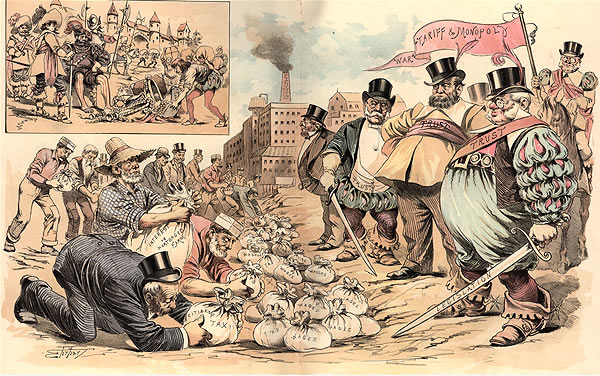
Today (Dec. 14), the FCC votes on a repeal of Net Neutrality, a set of regulations for internet service providers (ISPs), the companies that provide internet access to millions of Americans. The regulations prevent ISPs from selectively blocking, slowing or charging higher fees for its services. Many oppose Net Neutrality because its regulations entangle the government in the affairs of private corporations. In most cases, such actions are detrimental to a free market, but history shows us that in circumstances similar to internet service, governmental regulation becomes essential to the well-being of a free society.
In the late 1800s, Western farmers were in trouble. Farmers in the West relied on railroads to deliver their goods to market in the East; without such transportation, farms would be unable to sell their products and would fail. The railroads had the power to set their own prices for this exclusive service, a power which they heartily abused with hefty price increases.
The power of the railroads stemmed from their monopolistic statuses. Railroads required long stretches of land, and Congress fulfilled this requirement by granting right-of-ways to the railroad companies. This government sponsorship created a daunting barrier to entry, which when compounded with horizontal integration (companies purchasing their competitors), gave the railroads disproportionate power and resistance to the normal regulating forces of supply and demand.
Faced with the insurmountable power of the railroads and the total dependence of the farmers on these corporations, the Supreme Court, in Munn v. Illinois, allowed the government to regulate the prices charged by railroads on the grounds that the regulation was necessary to protect public interest.
As distasteful as government intervention in private affairs may be, sometimes it is necessary.
Following the 2008 mortgage crisis, the federal government offered bailouts to several large banks. Secretary of the Treasury Hank Paulson, an advocate of laissez-faire economics, did not want to interfere with these private banks (going so far as to allow Lehman Brothers to fail), citing the economic tenant moral hazard. However, Paulson reluctantly proposed a bailout because the banks were too big to fail, meaning that their collapse would trigger a worldwide economic meltdown.
Governmental intervention into private affairs is an abhorrence to liberty, but in the United States’s heavily privatized system, corporations can become so large and so essentially integrated into the infrastructure of our society that governmental action becomes imperative.
In the information age, internet service providers, have joined railroads and banks as corporations which must be regulated to preserve the function of our society.
Like railroads, internet service providers, such as AT&T, Comcast, Verizon, or Charter, rely on government granted right of ways through which to run their fiber-optic cables, often making use of government infrastructure such as telephone poles. With the license to right of ways often comes franchise agreements, in which some state and local governments grant regional monopolies, giving the solitary right to run high speed internet to a particular corporation.
Like railroads, ISPs exhibit monopolistic characteristics. Through horizontal integration, AT&T became a government recognized and regulated monopoly, until 1984 when the company was trust busted into several smaller companies. Since then, AT&T has bought back several of these companies, such as BellSouth and Pacific Telesis. Vertical integration is also present, as exemplified by the ownership of content providers by internet service providers, such as Comcast’s ownership of NBCUniversal or Verizon’s ownership of Yahoo. Without regulation, these companies could offer better service to their own content at the expense of competitors.
Like the two aforementioned industries, internet service providers have become essential to the structure of our society. AT&T alone services 15.7 million internet connections. With a multitude of companies depending on internet connectivity – high speed internet, as offered by fiber-optic connections, in particular – for their financial survival, and the 37% of Americans who get their news from the internet relying on its open platform for the free and democratic exchange of ideas, internet service is a matter of public interest.
Internet service providers are required for the normal functioning of society, immune to the naturally regulating effects of free-market forces, and partially supported by the government; therefore their regulation is not only a necessity, but an obligation of the government.


Awesome! Its actually amazing piece of writing, I have got much clear idea about from this
post.
LikeLike